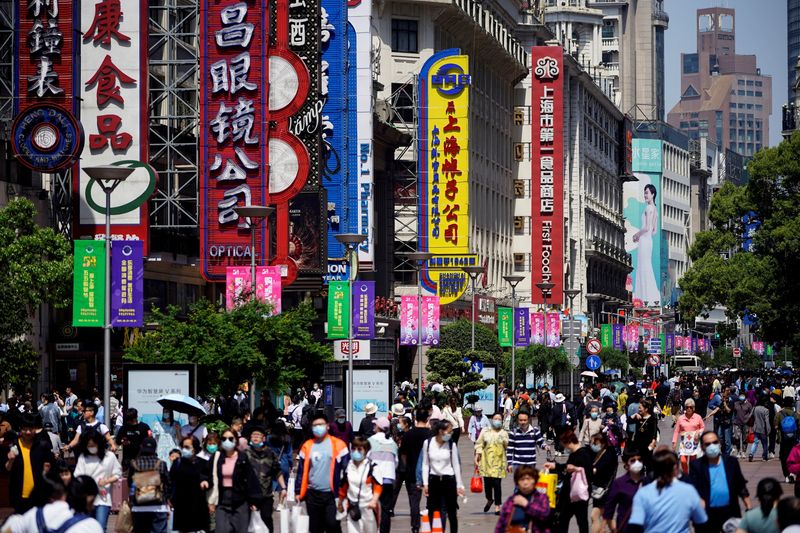BEIJING (Reuters) – China’s factory-gate prices showed an annual fall for a second month in November while consumer inflation slowed, indicating weak activity and soft demand in an economy that has been held back by tough pandemic controls.
Analysts said they expected the government to keep interest rates low and take measures to boost confidence.
The producer price index (PPI) was down 1.3% on a year earlier, unchanged from an annual contraction seen in October, according to National Bureau of Statistics (NBS) data issued on Friday. That was slower than a 1.4% fall tipped in a Reuters poll.
The November consumer price index (CPI) rose at its slowest pace in eight months, climbing 1.6% from a year earlier, which was less than the 2.1% annual rise seen in October but in line with a Reuters poll.
“These data suggest the economic momentum (continues) to weaken,” said Zhiwei Zhang, chief economist at Pinpoint Asset Management.
A high-level political meeting on Tuesday, a gathering of the ruling Communist Party’s Politburo, emphasised that in 2023 the government would focus on stabilising growth, promoting domestic demand and opening up to the outside world.
Zhang said that, although the government had eased pandemic controls over the past week, it would take further measures to spur the economy.
“The Politburo meeting … identified weak confidence as a major problem for the economy,” he said. “I expect the government will do more to boost market and household confidence. The fast pace of reopening indicates the government’s sense of urgency.”
Growth in the world’s second-largest economy has sagged this year, largely impacted by the uncompromising COVID-19 curbs as global demand has also wavered.
The producer price deflation and milder consumer price inflation of November accompanied record COVID-19 infections and related curbs that disrupted production and curbed mobility.
Although markets have cheered the shift in pandemic policy, economists say it will likely depress growth over the next few months as infections surge, bringing an economic rebound only later in 2023.
China’s negative PPI, slowing CPI growth in Nov https://www.reuters.com/graphics/CHINA-ECONOMY/INFLATION/xmvjkkgmqpr/chart.png
Producer deflation was led by the steel industry, in which prices were down 18.7%.
Part of the explanation for slower growth in consumer prices was in food markets.
Food prices were up 3.7% on a year earlier, whereas the rise seen in October was 7.0%. Within the food category, pork was a factor behind moderating inflation: it was 34.4% pricier in November than in the same month last year, but in October the annual rise had been 51.8%.
Underlying core annual inflation, which excludes volatile food and energy prices, was just 0.6% in November, unchanged from October
“The overall inflation pressure remains benign in China, and we expect the CPI inflation will be around 1.6% for 2023, down from 2.0% in 2022. Given this, the monetary policy will remain accommodative over the coming year,” said Hao Zhou, chief economist at Guotai Junan Group.
China’s central bank has kept its benchmark one-year loan prime rate at 3.65% since August. It expects consumer inflation to remain moderate next year.
(Reporting by Liangping Gao and Liz Lee; Editing by Edmund Klamann and Bradley Perrett)
